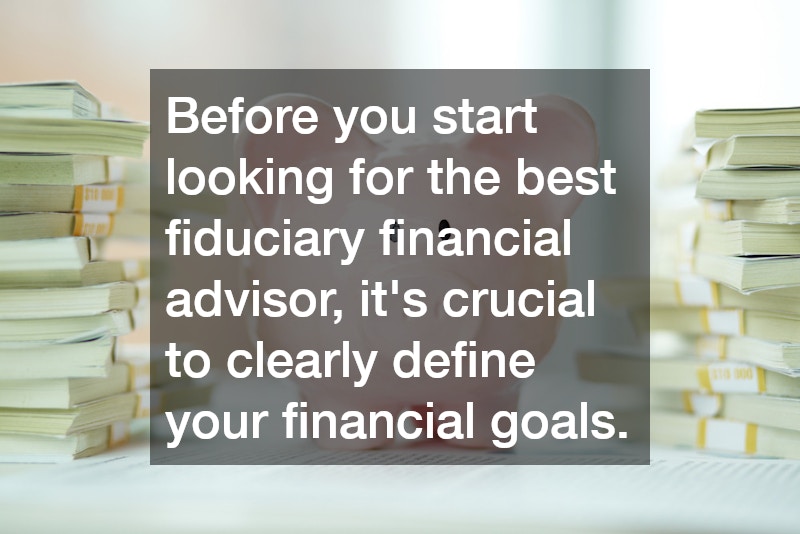
Choosing the right financial advisor is one of the most important steps you can take to secure your financial future. Whether you’re planning for retirement, saving for a significant purchase, or managing a complex portfolio, the right advisor can make all the difference. However, with so many options available, finding the best fiduciary financial advisor can feel overwhelming. In this guide, we’ll walk you through the steps to help you choose a financial advisor who is both trustworthy and equipped to meet your financial needs.
1. Understand What a Fiduciary Financial Advisor Is
The first step in choosing the best fiduciary financial advisor is understanding what sets them apart from other types of financial advisors. A fiduciary is legally obligated to act in your best interests. This means that a fiduciary financial advisor must recommend products and strategies that are right for you, even if they don’t result in higher fees for them.
Non-fiduciary advisors, on the other hand, may not be required to act solely in your best interest and might recommend products based on commission or personal incentives. This is why many people prefer to work with fiduciary financial advisors — they offer an extra level of trust and transparency.
2. Determine Your Financial Goals
Before you start looking for the best fiduciary financial advisor, it’s crucial to clearly define your financial goals. Are you looking for retirement planning? Do you need help managing investments? Are you interested in estate planning or tax strategies? Knowing what you want to achieve financially will help you find an advisor with the expertise to meet your needs.
Once you’ve identified your goals, you can better evaluate potential advisors based on their specialties. Some advisors focus on retirement planning, while others may specialize in tax planning, estate planning, or investment management. By matching your goals to their expertise, you can find the right fit.
3. Look for Credentials and Experience
The best fiduciary financial advisor will have the credentials and experience to back up their advice. Look for advisors who hold certifications like Certified Financial Planner (CFP), Chartered Financial Analyst (CFA), or Personal Financial Specialist (PFS). These designations indicate that the advisor has completed extensive education, passed rigorous exams, and adheres to high ethical standards.
In addition to credentials, experience matters. Ask potential advisors how long they’ve been in the industry and what type of clients they typically work with. An advisor who has worked with clients similar to you will likely have a better understanding of your unique financial needs and challenges.
4. Research Their Fee Structure
Understanding how an advisor is compensated is crucial when choosing the best fiduciary financial advisor. Fiduciary financial advisors typically use one of three compensation structures: fee-only, fee-based, or commission-based.
Fee-only advisors charge a flat fee, hourly rate, or a percentage of the assets they manage. Because they do not receive commissions from the sale of financial products, their recommendations are more likely to be objective and in your best interest.
Fee-based advisors may charge a combination of fees and commissions, which can create a potential conflict of interest if they receive compensation from selling specific products.
Commission-based advisors earn money from the financial products they sell, which could lead to biased recommendations.
For most people, working with a fee-only fiduciary financial advisor is the best option for ensuring that your advisor is truly acting in your best interest without any hidden incentives.
5. Check for Fiduciary Status
When you’re looking for the best fiduciary financial advisor, it’s essential to confirm that they are, indeed, a fiduciary. While many advisors use the term “fiduciary,” not all are legally obligated to follow this standard. Ask the advisor directly whether they adhere to the fiduciary standard 100% of the time and whether they are willing to put that in writing.
If an advisor hesitates to confirm their fiduciary status or seems unclear about their obligations, it may be a red flag. Always ensure that your advisor is committed to acting in your best interest before moving forward.
6. Consider Communication and Compatibility
Financial planning is a long-term process, and the relationship with your financial advisor should be a collaborative one. Choose an advisor who communicates clearly, listens to your concerns, and is willing to explain complex financial topics in a way that makes sense to you.
Compatibility is also important. You’ll want to work with someone you trust and feel comfortable discussing sensitive financial matters with. Some people prefer a more hands-on approach, while others want an advisor who takes the lead. Be honest about your preferences and choose an advisor who aligns with your communication style and expectations.
7. Ask for References and Reviews
Before finalizing your decision, ask potential advisors for references from current or past clients. Hearing about others’ experiences can provide valuable insight into how the advisor works and whether they deliver on their promises. In addition to references, check online reviews and ratings from trusted sources like the Better Business Bureau or professional organizations such as the National Association of Personal Financial Advisors (NAPFA).
.




